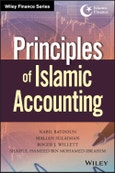Principles of Islamic Accounting is the first and only text that covers the fundamentals of Islamic accounting in English. A comprehensive guide, this groundbreaking reference offers both insight into Islamic accounting best practices and disclosure for Shariah-compliant instruments. Covering everything from basic transaction analysis to the preparation of financial statements, this reference serves as a broad framework around which undergraduate students can build their understanding of the Islamic business environment by offering context and showcasing how Islamic values can influence the disclosure of financial information.
Islamic accounting is becoming an increasingly important aspect of the business field as globalization results in a surge in business partnerships and transactions around the world. Today's students need to understand Islamic accounting principles in order to effectively work with professionals who adhere to these standards - and accessing this information via text in English was not possible until this revolutionary reference.
- Review the basics through an introduction to Islamic accounting
- Understand the recording process, and how to complete the accounting cycle and adjust accounts as necessary
- Explore accounting for assets, liabilities, equity, and sukuk, as well as zakat and takaful accounting
- Discover details regarding Islamic commercial law, accounting for Islamic financial institutions, and Islamic corporate governance and sustainability, and look at auditing from an Islamic perspective
Principles of Islamic Accounting is an essential text for first-year university students who are studying Islamic accounting, as well as professional societies and organizations that support the use of Islamic accounting principles, such as The Islamic Finance Professionals Association.
Table of Contents
Preface ix
About the Authors xiii
About the Companion website xv
CHAPTER 1 The Islamic Accounting Environment 1
CHAPTER 2 Recording Transactions and Market Values in Islam 21
CHAPTER 3 Adjusting Islamic Accounting Records at the Close of the Accounting Period 71
CHAPTER 4 Islamic Financial Statements 93
CHAPTER 5 Accounting for Sukuk 141
CHAPTER 6 Accounting for Zakat 165
CHAPTER 7 Islamic Commercial Contracts 191
CHAPTER 8 Application of Islamic Financial Contracts to Accounting 219
CHAPTER 9 Social Responsibility Accounting 251
Bibliography 277
Index 281








